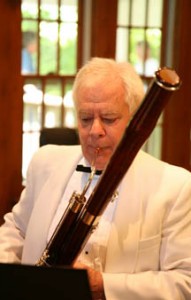
I’m often asked how I go about putting together the music for our Midsummer’s Music programs. My usual method begins with a legal sized tablet. I draw a vertical line down the middle of the page and write “piano” above one column and “no piano” above the other. Since about half of our concerts take place in venues with pianos and the other half without, that’s a pretty fundamental consideration. I then start writing down works that come to mind in the proper column. These may be suggestions from one of our musicians, an audience member, or they may be works that I have come across from reading or research done online. I also go to the complete Midsummer’s Music repertoire list I have kept since our very first year that includes everything we have played in the last twenty-four years. In addition, I look over previous season’s lists for works that didn’t make the final cut that year.
This is a process that goes on for months. I don’t populate my tablet with works immediately. I may just write down a few, but I keep it handy so that I can add to it as ideas present themselves. At this point, I’m not usually thinking about complete programs. I am just trying to gather a good list of a variety of works hoping that when I do want to group them into programs, some ideas will jump out at me from what’s in front of me.
I enjoy this part of the process. There is no pressure involved in writing the name of a composition down on paper, even if it is by an obscure composer or is an unknown work. The more nerve-racking part is the grouping of several pieces into an individual program and then trying to make sure that the programs I have assembled work together to create some kind of coherent season. Critical choices now have to be made.
The first few programs usually come together fairly readily. Getting the remaining ones into place, however, is a bit like a Chinese puzzle. Balance and variety are always issues. I may find that I have painted myself into a corner with too many German works, or maybe I want to have more works involving the clarinet. Size also matters. A work for nine instruments will do just fine at The Hardy Gallery, but if I try to do that in most homes, the bulk of the audience would have to sit on the lawn.
Frequently it just comes down to one last program or the need for one more piece in this program or that. That’s when I really wish I could get on the phone and say, “Mr. Beethoven, would you mind writing us a really nice piece for oboe, horn, violin, viola, cello, and piano of about 18 minutes in length?”
Instead, I usually go to the drawers in my library that are especially made to house CDs. I look over dozens – even hundreds, it seems. I pull many out and put them in small boxes. Typically I take them down to the kitchen when Jean is making dinner and put a piece on the CD player in the kitchen. This is the acid test. She can be ruthless.
Jean doesn’t take long to offer an opinion. Like the Roman Coliseum, it’s either thumbs up or thumbs down, and the poor sucker doesn’t get much of a chance to plead his case. She has attended too many orchestral auditions. Some applicants have no business playing a professional audition. Jean shows little mercy for a really unqualified auditionee, and not much more for a work she doesn’t take a quick liking to, especially when she is making dinner.
Many times, her response is, “John Q. Audience is gritting his teeth,” or “John is falling asleep.” “John” is a fictional name for a wonderful audience member who used to attend our concerts, and “John” would make his preferences known after each concert. His tastes tended to be conservative. This is all good because we want to know what our audience likes. We pay attention to all the feedback we get. Sometimes I try to convince Jean she needs to listen further. Sometimes I slip the work in on another evening hoping for a different outcome. Rarely do I include something of which she doesn’t approve.
In the remaining week of our concerts through July 15, we are playing two different programs in several locations. One involves works that include piano; the other is exclusively for winds and strings. One is from one side of the original legal tablet; the other is from the opposite side. However, they have all passed the “John Q. Audience” test in the heat of the kitchen. Please call our office at 920.854.7088 or visit www.midsummersmusic.com for reservations or more information. You don’t want to miss a note because this is pretty good home cooking, and, as always, even John Q. Audience would approve.
